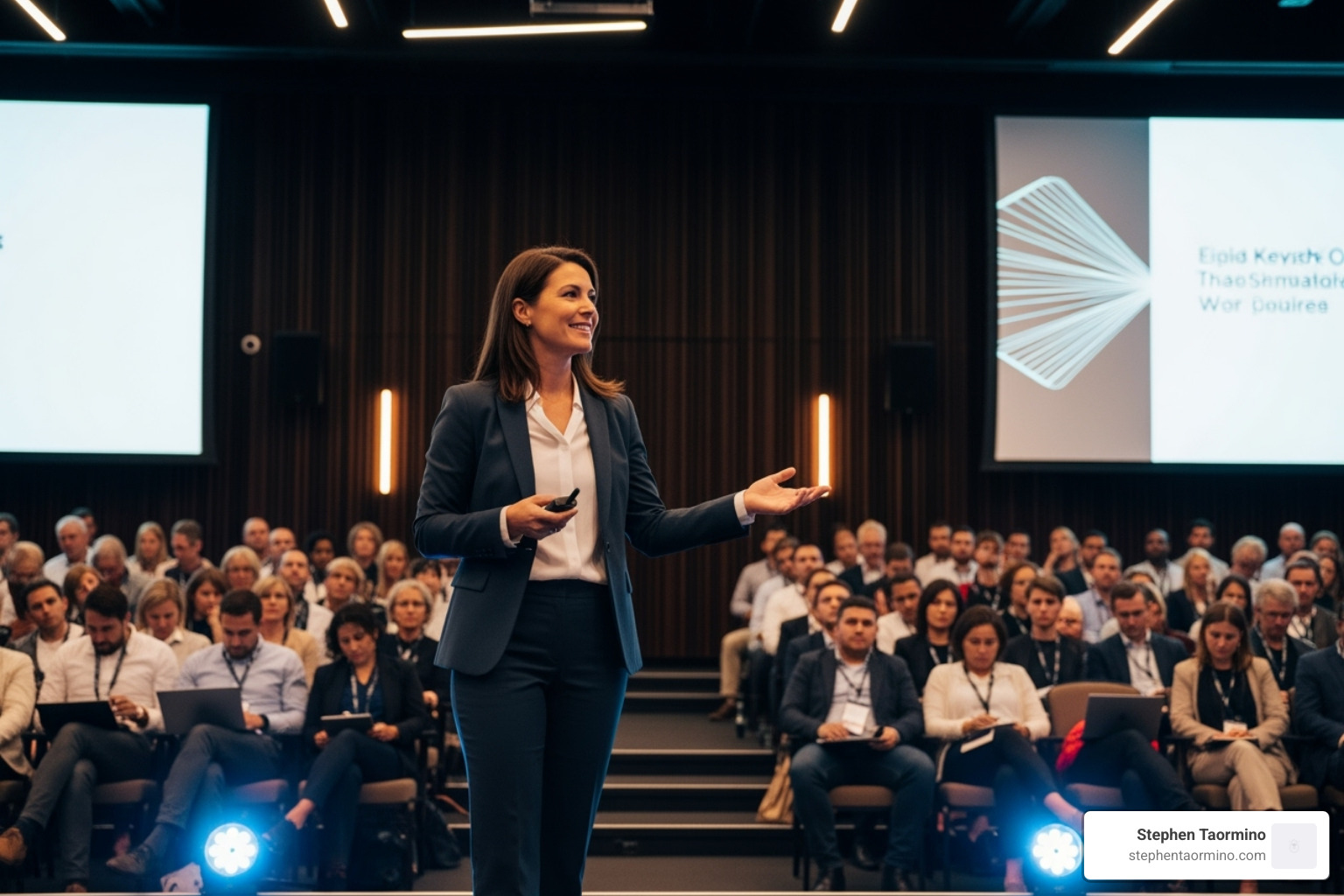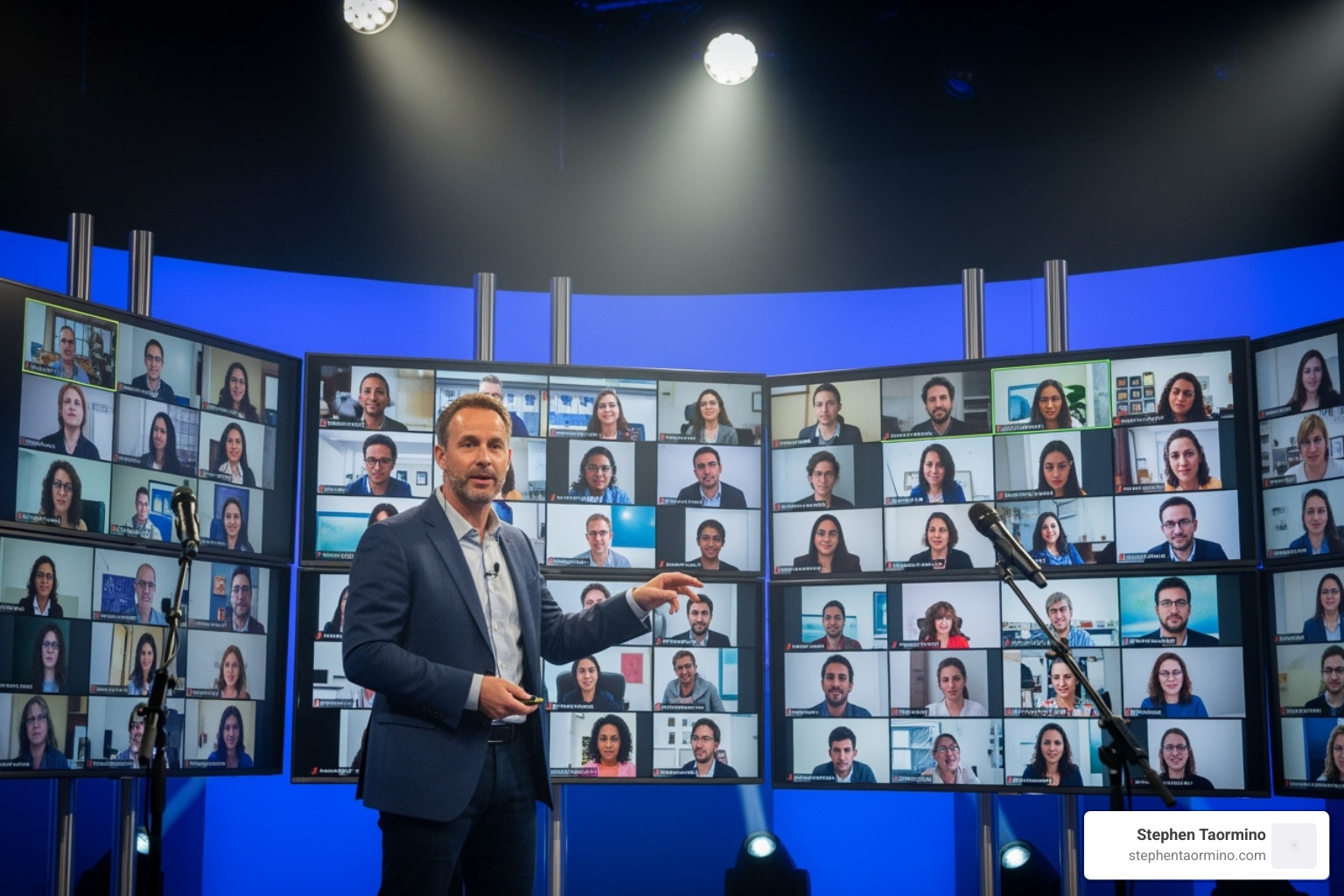Keynote Speaker: Unforgettable Impact in 2025
More Than Just a Talk: Understanding the Strategic Role of a Keynote Speaker
A keynote speaker is the driving force of an event, delivering the core message that establishes the theme and resonates with the audience long after it’s over. Their role is to transform an ordinary meeting into an inspiring, cohesive, and memorable experience.
The term originates from the musical practice of a “key note” determining the pitch for a song, which is exactly what a keynote speaker does for an event. They set the tone, frame the agenda, and generate excitement that can significantly boost attendance. Typically delivering opening or closing addresses, these speakers are strategically chosen for their expertise and name recognition to create a foundation for success.
As Steve Taormino, I’ve seen how the right keynote speaker lifts an event. My experience delivering presentations to international audiences has reinforced that selecting the right voice is crucial for any organization wanting to create a meaningful and lasting impact.

A keynote speech is designed to summarize the most important revelation or set the underlying tone for the entire program. This foundational role is why they are so effective at drawing attendees to conferences, corporate meetings, and conventions. They don’t just inform—they inspire action and leave lasting impressions.
The Core Role of a Keynote Speaker in Any Event
When planning an event, the keynote speaker acts as the heartbeat of your program. They weave the event’s theme into a core message, setting the emotional and intellectual tone for every session. This unifying purpose is what transforms a simple gathering into a memorable experience that attendees will talk about for months.

Smart event planners know a respected keynote speaker can drive attendance more effectively than many marketing campaigns. Their presence signals quality and provides a shared experience that connects a room full of individuals into a community with common goals.
Keynote Speaker vs. Other Event Speakers
While every speaker has a purpose, the keynote speaker holds a unique position. They are the headliner, setting the overarching theme with a broad, visionary message meant to inspire the entire audience. In contrast, guest speakers dive deep into niche topics, providing specialized, practical instruction. Moderators facilitate panel discussions, ensuring conversations flow smoothly, while workshop facilitators guide hands-on learning in smaller groups. Each role is vital, but the keynote speaker is the one who creates the narrative that ties everything together.
How a Keynote Contributes to Overall Success
The impact of a great keynote speaker ripples through every aspect of an event’s success. Here’s how:
- Drives Attendance: A well-known speaker is a powerful marketing tool, converting interest into registrations.
- Improves Reputation: A compelling keynote reflects positively on your organization, boosting your brand’s credibility for current and future events.
- Provides Memorable Takeaways: They craft sticky messages and actionable insights that attendees can apply immediately.
- Boosts Engagement: A high-energy opening keynote creates momentum that carries through the entire event, encouraging participation.
- Reinforces Event Goals: They keep everyone focused on the bigger picture, reminding attendees why they are there and what they can achieve together.
How to Select the Right Keynote Speaker
Choosing the perfect keynote speaker requires a strategic approach centered on your audience and event goals. Start by understanding who your attendees are and what challenges they face. Then, clarify what you want to achieve—are you looking to inspire, educate, or spark innovation? Your goals and budget will guide your search.

Key Factors to Consider When Choosing
When vetting potential speakers, focus on these critical elements:
- Topic Alignment: Ensure the speaker’s message connects directly with your event’s core theme. You can often browse speakers by topic to find a good match.
- Expertise and Credibility: Look for individuals with real-world experience who can share unique insights.
- Reputation and Testimonials: See what past clients say about their preparation, delivery, and impact.
- Stage Presence: An unforgettable speaker commands attention, uses storytelling, and engages the audience from start to finish.
- Customization: The best speakers tailor their content to your organization and audience, making the message feel personal and relevant.
The Benefits of an Expert or Well-Known Speaker
Investing in a recognized keynote speaker offers significant returns. Their name alone lends credibility to your event, acting as a major drawing power for registrations and ticket sales. High-profile speakers often attract media attention, generating organic publicity. Associating your brand with respected thought leaders, like a proven leadership development expert, lifts your organization’s reputation and positions you as an industry leader.
Simplifying the Booking Process
The booking process is straightforward when you’re prepared. Start early, as popular speakers are booked months in advance. Be clear about your vision, audience, and goals during the initial consultation. Review a curated shortlist of candidates and be prepared to move quickly on availability and contracting. Professional bureaus handle the details and build their commission into the speaker’s fee, so there are no surprise costs. Pre-event coordination ensures the speaker is prepared and all logistics are handled, leading to a smooth and successful experience.
The Evolution of Keynote Speaking: Trends & Topics
The role of the keynote speaker has evolved from a formal lecturer to a dynamic experience creator. Today’s audiences expect more than a one-way delivery of facts; they want an interactive journey that challenges assumptions and sparks conversation. Technology has been a major driver of this shift, with speakers now using multimedia and interactive tools to engage audiences in person and online.

Popular Keynote Themes and Topics
Modern keynote topics reflect the challenges and opportunities of our time. While specific needs vary by industry, these themes consistently resonate with audiences:
- Leadership: Fresh approaches to managing teams and navigating complex business environments.
- Change Management: Strategies for building resilience and thriving during disruption. A skilled change management speaker is invaluable here.
- Digital Change & Technology: Guidance on navigating AI, automation, and other emerging technologies.
- Motivation & Peak Performance: Inspiring stories and practical strategies for open uping potential, a topic covered by many peak performance experts.
- Mental Health & Well-being: Essential conversations about stress management, work-life balance, and resilience.
- Diversity, Equity, and Inclusion (DEI): Building inclusive cultures that drive innovation and success.
Emerging Trends in the Speaking Industry
The speaking industry is rapidly adapting to new expectations and technologies. Virtual and hybrid events are now standard, requiring speakers to master engaging audiences through a screen. This has led to a rise in interactive sessions that use polls, Q&A, and breakout rooms to encourage participation.
Presentations are also becoming shorter and more focused, with 20-30 minute high-impact talks gaining popularity. Across all formats, authenticity and vulnerability have become key, as audiences connect deeply with speakers who share genuine personal stories of both success and failure.
Finally, the experience no longer ends with the speech. Many speakers now provide extended learning materials like videos, articles, or follow-up sessions to reinforce their message, similar to how one might host pre-recorded webinars for continued engagement.
What Qualities Make a Keynote Speaker Effective and Engaging?
What separates a memorable keynote speaker from a forgettable one? It’s a blend of charisma and skill that creates a genuine connection with the audience. The most impactful speakers possess exceptional storytelling ability, changing complex ideas into vivid, emotional narratives that stick.
Other essential qualities include:
- Stage Presence: A magnetic quality that commands attention through confident body language and dynamic vocal delivery.
- Authenticity: Audiences connect with speakers who share genuine experiences, including challenges and failures.
- Deep Expertise: A passionate, profound understanding of their subject matter that goes beyond surface-level knowledge.
- Audience Connection: The ability to read the room and adapt their delivery to make everyone feel seen and heard.
- Customization: Tailoring the message to the specific audience and event goals, which is a cornerstone of our approach to keynotes.
The Anatomy of an Unforgettable Speech
An unforgettable keynote speech follows a structure designed for maximum impact:
- A Strong Opening: A hook—like a surprising statistic, personal story, or provocative question—that grabs immediate attention.
- A Clear Structure: A logical flow that takes the audience on a journey from a challenge to a solution.
- An Emotional Narrative: Vivid storytelling that taps into universal emotions and makes the message relatable.
- Actionable Takeaways: Clear, practical insights that answer the question, “What can I do differently tomorrow?”
- A Powerful Closing: A compelling call to action or a poignant final thought that leaves a lasting impression.
Examples of Impactful Keynotes
History’s most impactful keynotes combine personal authenticity with universal truths. Steve Jobs’ Stanford address used simple stories to convey a powerful message about connecting life’s dots. Simon Sinek’s “Start With Why” gave leaders a new framework for purpose-driven motivation. Brené Brown’s talks on vulnerability reshaped conversations about courage and leadership. These speakers didn’t just share information; they provided new ways of seeing the world. For those inspired to do the same, learning how to get keynote speaking engagements is the next step.
Frequently Asked Questions about a Keynote Speaker
When planning an event, several common questions about hiring a keynote speaker often arise. Here are concise answers to the most frequent inquiries.
What is the difference between a keynote speaker and a plenary speaker?
While the terms are often used interchangeably, there’s a subtle distinction. A plenary speaker addresses all event attendees at once (a “full” session). A keynote speaker is a specific type of plenary speaker who delivers the foundational speech that sets the main theme and tone for the entire event. An event can have an opening keynote, a closing keynote, and other plenary sessions in between.
How much does it cost to hire a keynote speaker?
Fees for a keynote speaker vary widely, from a few thousand dollars for an emerging expert to six figures for a world-renowned celebrity. The cost depends on several factors:
- Recognition and Demand: A speaker’s public profile is the biggest factor.
- Event Type: Corporate events often have larger budgets than non-profit or educational functions.
- Customization: More preparation time for a custom speech can increase the fee.
- Travel Expenses: These are typically budgeted separately from the speaker’s fee.
When working with a speakers bureau, their commission (usually 25-30%) is typically included in the quoted fee, not added on top.
How long is a typical keynote speech?
A standard keynote speech is typically 45 to 60 minutes long. This allows enough time to develop a theme, share stories, and offer actionable takeaways without losing audience attention. However, formats are becoming more flexible. Shorter, high-impact talks of 20-30 minutes are popular for virtual events and packed agendas. Longer sessions of 75-90 minutes may be used for in-depth topics or to include an extended Q&A. The ideal length depends on your event’s schedule and the speaker’s style.
Conclusion: Lift Your Event with the Right Voice
The strategic value of a keynote speaker goes far beyond the podium. They are the architects of your event’s success, changing an ordinary meeting into a memorable experience that unifies your audience and inspires action. Investing in the right speaker pays dividends in engagement, social buzz, and your organization’s reputation.
Attendees don’t just remember a good speech; they remember the organization smart enough to host it. As someone who has delivered impactful keynotes on marketing psychology, leadership, and digital change, I’ve seen how the right message at the right moment can shift perspectives. My approach combines authoritative expertise with practical, actionable insights custom to your audience.
Your next event deserves a voice that will lift the entire experience. A great keynote speaker doesn’t just present—they connect, challenge, and transform. When you’re ready to make your event unforgettable, choosing the right voice is the most important decision you’ll make. To explore how a strategic presentation can serve as a catalyst for your goals, learn more about how you can leverage the power of a compelling message for your own objectives, perhaps even as you become a campaign speaker yourself.

